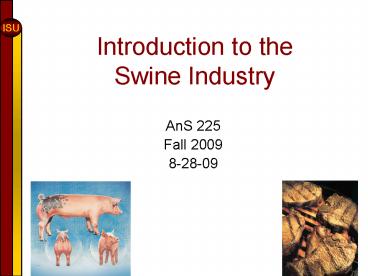Introduction to the Swine Industry - PowerPoint PPT Presentation
1 / 39
Title:
Introduction to the Swine Industry
Description:
Today Producing Food Products Which Meet Specific Preferences. ISU. ISU. ISU ... Nutritional Value. Food Safety. 8. ISU. ISU. ISU. Pork Production: 1960s - 1970s ... – PowerPoint PPT presentation
Number of Views:58
Avg rating:3.0/5.0
Title: Introduction to the Swine Industry
1
Introduction to theSwine Industry
- AnS 225
- Fall 2009
- 8-28-09
2
(No Transcript)
3
(No Transcript)
4
(No Transcript)
5
Changes in Hog Type
6
7
Industry Transition
- 1970s Raising Hogs
- Today Producing Food
Products Which Meet Specific
Preferences
8
Consumer Driven Industry
- Diet/Health Concerns
- Nutritional Value
- Food Safety
9
Pork Production 1960s - 1970s
- Large number of small diversified operations
- Rotational crossbreeding systems
- Most time spent breeding sows, grinding feed,
loading hogs, etc. - Numerous packer buying stations
- Little grade and yield, contracting
- Little attention to meat quality
- Seedstock industry dominated by purebred breeders
10
Industry Transition 1980s Today
- Larger and fewer production units
- Intensive management specialization, 3-site
production - Terminal crossbreeding systems
- Technology - AI, SEW, nutrition, etc.
- Plant delivery of hogs
- Corporate breeding companies
- Environmental concerns
- Production shift away from Cornbelt
11
Todays Pork Industry
- Production is in relatively few hands
- Contracting is common practice
- Margins can be very small
- Risk is much greater
- Exports are integral part of production
- Technology is essential to reduce cost of
production - Welfare and environmental concerns are common
11
12
Forces of Change in U.S. Pork Production
Shifts in RegionalProduction TowardNon-Tradition
al Areas
Increased ProducerConcentration / Big are
Getting Bigger
Significant Shift TowardContract Production
New GenerationPork Genetics
Increasingly Restrictive Environmental Regulations
U.S. Pork Production
New ConfinementProduction Systems Production
Technology
Changing Consumer Tastes and Preferences
Insufficient US Packing Capacity and Shifts
in Regional Processing
13
Top Pork Producing Countries - 2008(Carcass
Weight Equivalent)
13
Source USDA/FAS
14
Production (x million pigs)
- Country 2004 2008
- China 583.1 600.0
- EU 27 256.1 259.0
- USA 102.8 115.1
- Russian Fed. 35.0 41.7
- Brazil 30.0 35.1
- Canada 33.2 30.0
- Japan 17.2 16.9
- Mexico 15.4 15.3
- Korea 14.8 13.6
14
Source USDA/FAS
15
World Pork Production
1996
2007
Chinas pork production is roughly 5.5 times
larger than U.S. production and number
slaughtered is 6.8 times larger Sow beginning
stocks are over 8 times larger than U.S.
A 2 decrease in Chinas production nearly
Japans total production 1 MMT CWE
Source USDA, USMEF
16
World Pork Production -- 2007
16
Source USDA/FAS
17
World Pork Consumption -- 2007
17
Source USDA/FAS
18
Global Beef Pork Consumption Growth
Source OECD/FAO Agricultural Outlook 2007,
Thousand metric tons
19
Growth in World Pork Production1999-2004
Thousand Metric Tons
Source USDA/FAS
19
20
Source USDA/FAS
21
U.S. Pork Exports, Imports, Net (Million Lbs.)
21
22
U.S. Pork Exports 1999-2008(Including Variety
Meats)
17 Consecutive Record Setting Years!!
22
23
Source U.S. Meat Export Federation
24
U.S. Pork Imports Exports, 2000-2008
25
U.S. Pork Imports Exports as of U.S. Pork
Production, 2006-2008
26
U.S. Pork Exports, 2005-2008
27
Value of U.S. Pork Exports (millions)
27
28
(No Transcript)
29
(No Transcript)
30
World Market Share of Major Pork Exporters
30
31
U.S. Now Has Over 27 Share of World Pork Exports
27
18
Source USDA
32
Destinations of U.S. Pork Pork Variety Meat
Exports 2007
Percent
Source USDA
33
Exports Help Diversify our Markets
Hams Variety Meats to Mexico
Shoulder Cuts to Russia
Butts, Picnics Bellies to Korea
Variety Meats to China
Loins Tenderloins to Japan
34
Factors Affecting U.S. Exports
- Local Economic Situation
- Political Situations H1N1
- Disease-Related Threats
- Avian influenza
- BSE
- FMD
- Strength of U.S. dollar
- Favorable exchange rate makes U.S. more
price-competitive
34
35
35
36
2008 World Per Capita Pork Consumption
- Region Metric Tons (Millions) Per Capita (lb)
- China 44.9 74.1
- EU--27 20.9 86.5
- U.S. 8.6 62.3
- Russian Fed. 3.0 45.8
- Japan 2.5 43.1
- Brazil 2.4 26.6
- Source USDA Foreign Agricultural Service
36
37
U. S. Per Capita Consumption, Retail Wt.
37
38
38
39
Global Meat Production
Million Metric Tons
Pork
Beef
Poultry
39































